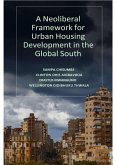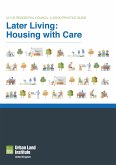A Neoliberal Framework for Urban Housing Development in the Global South highlights the factors which predict urban housing development from developing countries' perspective, providing a guide for countries in the sub-Sahara, where governments have limited financial resources competing among several needs. Anchored on neoliberalism, it argues that urban housing development is an eight-factor construct consisting of legal framework, tenure, stakeholder coordination, stakeholder participation, stakeholder capacity, adaptive housing regulations, housing finance, and governance.
The authors outline the role of the state in creating an enabling environment for other stakeholders to participate in the provision of affordable housing for all.
Dieser Download kann aus rechtlichen Gründen nur mit Rechnungsadresse in A, B, BG, CY, CZ, D, DK, EW, E, FIN, F, GR, HR, H, IRL, I, LT, L, LR, M, NL, PL, P, R, S, SLO, SK ausgeliefert werden.









